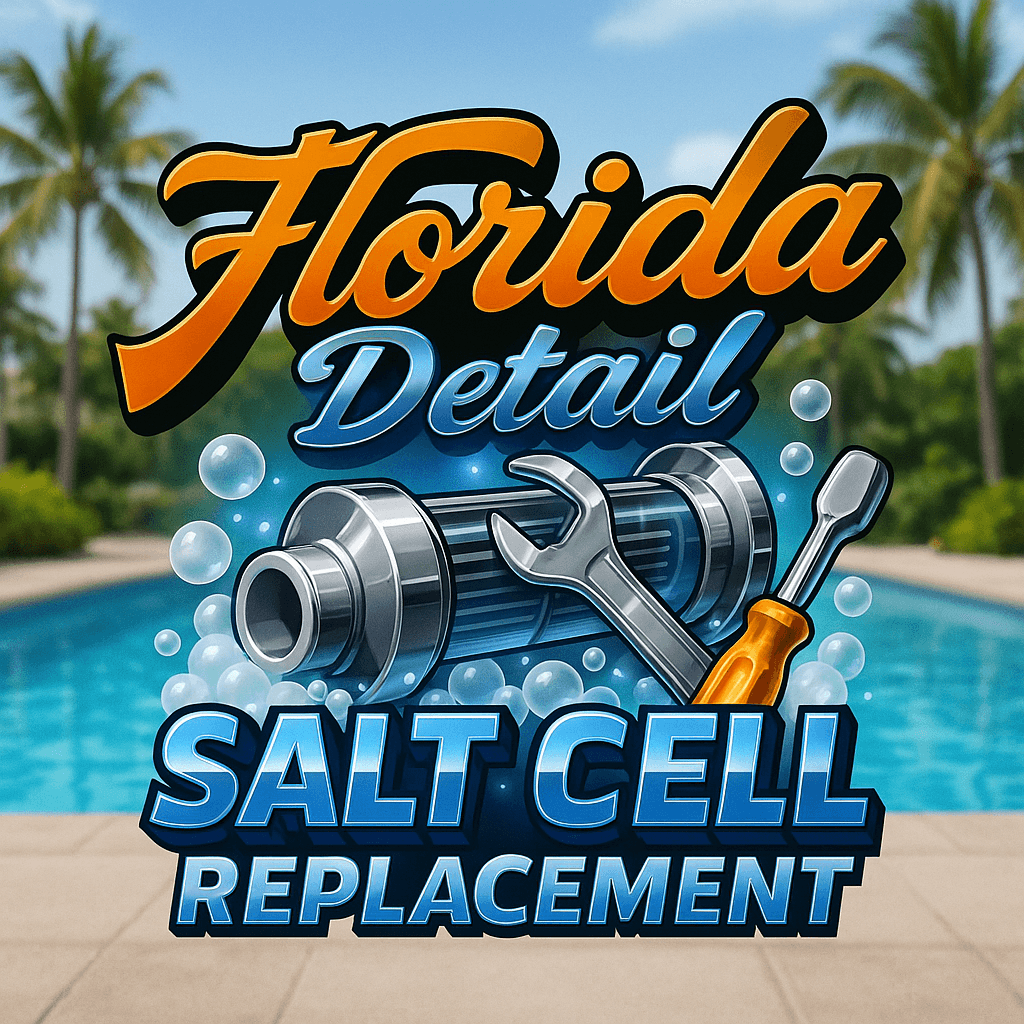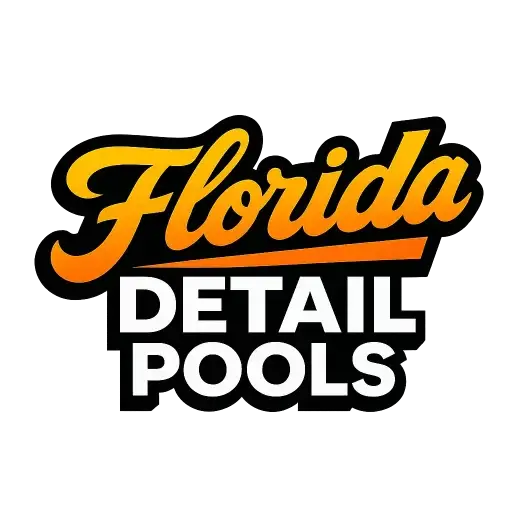Essential Saltwater Pool Maintenance for North Port & Charlotte County: Your Complete Guide
Saltwater pools have revolutionized backyard swimming experiences throughout North Port, Port Charlotte, and Charlotte County, offering a more comfortable alternative to traditional chlorine pools. The appeal is undeniable: softer water that’s gentler on skin and eyes, reduced chemical handling, and a more natural swimming experience that many describe as silky smooth. However, the common misconception that saltwater pools are “maintenance-free” has led many Florida homeowners into costly mistakes and equipment failures.
At Florida Detail, we’ve maintained hundreds of saltwater pools across Southwest Florida, and we’ve learned that while these systems offer significant advantages, they require specialized knowledge and consistent care to perform optimally. The unique challenges of Florida’s climate—intense UV radiation, frequent storms, and year-round swimming seasons—demand a more sophisticated approach to saltwater pool maintenance than many homeowners realize.
Understanding proper saltwater pool care isn’t just about maintaining water clarity; it’s about protecting a significant investment in advanced pool technology while ensuring safe, enjoyable swimming conditions for your family. With the right maintenance approach, saltwater pools provide superior swimming experiences with lower long-term chemical costs and reduced maintenance hassles.
Understanding Saltwater Pool Technology and Florida’s Impact
Before diving into maintenance specifics, it’s essential to understand how saltwater pools work and why Florida’s environment creates unique challenges for these systems.
Saltwater Pool Operation: Saltwater pools use electrolytic chlorine generators (salt cells) that convert dissolved salt into chlorine through electrolysis. This process creates pure chlorine without the harsh chemical byproducts found in traditional chlorine pools, resulting in softer water that’s more comfortable for swimmers.
Florida-Specific Challenges:
- High UV exposure breaks down chlorine faster, requiring increased generator output
- Frequent rainfall dilutes salt levels and disrupts chemical balance
- High temperatures accelerate chemical reactions and equipment wear
- Extended swimming seasons prevent equipment rest periods common in northern climates
- Mineral-rich water in some areas can accelerate scaling and equipment corrosion
Understanding these factors helps explain why saltwater pools in Florida require more attention than those in other regions and why professional expertise is often necessary for optimal performance.
1. Master Salt Level Management for Optimal Performance
Salt level management represents the foundation of successful saltwater pool operation. Unlike traditional pools where chlorine is added directly, saltwater systems depend on precise salt concentrations to generate adequate sanitizer levels.
Optimal Salt Level Maintenance:
Target Ranges: Most chlorine generators operate optimally between 2,700-3,400 ppm, but specific requirements vary by manufacturer. Our equipment specialists can determine the exact requirements for your specific system and provide ongoing monitoring.
Testing Frequency: Weekly testing during normal conditions, with increased frequency during rainy season when dilution occurs rapidly. Professional-grade salt testing equipment provides more accurate readings than consumer test strips.
Salt Addition Procedures: When adding salt, distribute it evenly across the pool surface and allow 24-48 hours for complete dissolution before retesting. Adding salt gradually prevents temporary high concentrations that can damage equipment.
Rainy Season Management: Florida’s frequent storms can reduce salt levels significantly. Our storm recovery services include rapid salt level assessment and adjustment to restore proper generator function quickly.
Quality Considerations: Use only high-purity pool salt without additives or anti-caking agents that can damage generator cells or create water clarity issues.
The financial impact: Properly maintained salt levels ensure optimal chlorine production efficiency, reducing energy costs while extending generator cell life significantly.
2. Implement Professional Salt Cell Maintenance Protocols
The chlorine generator cell represents the heart of your saltwater system and requires specialized care to maintain peak performance and longevity. Proper cell maintenance can extend equipment life from 3-7 years, while neglect often results in premature failure and expensive replacements.
Comprehensive Cell Care Strategies:
Regular Inspection Schedules: Monthly visual inspections identify scaling, corrosion, or damage before they affect performance. Professional inspections include electrical testing and performance measurement beyond visual assessment.
Proper Cleaning Techniques: Scaling removal requires precise acid-to-water ratios (typically 10:1 water to muriatic acid) and proper safety procedures. Over-cleaning or using incorrect acid concentrations can damage cell plates permanently.
Calcium Balance Management: Maintaining proper calcium hardness (200-400 ppm) prevents both scaling and corrosion while ensuring optimal cell performance. Our water chemistry specialists provide precise calcium management tailored to your local water conditions.
Performance Monitoring: Advanced diagnostic tools measure actual chlorine output, identifying declining performance before complete failure occurs. This proactive approach prevents unsafe swimming conditions while maximizing cell life.
Professional Cell Services: Our equipment maintenance programs include specialized salt cell care that extends equipment life while ensuring consistent performance throughout Florida’s challenging climate.
Replacement Planning: Understanding cell life expectancy helps budget for future replacements while avoiding emergency situations that require immediate, often more expensive, solutions.

3. Achieve Superior Water Chemistry Balance
Saltwater pools require more sophisticated water chemistry management than traditional chlorine pools. The electrolytic process affects pH, alkalinity, and calcium balance in ways that demand specialized knowledge and regular attention.
Advanced Chemistry Management:
pH Control Challenges: Salt cells naturally raise pH during chlorine production, requiring regular pH reduction with muriatic acid or specialized pH reducers. Automated pH control systems can maintain optimal levels with minimal manual intervention.
Alkalinity Optimization: Total alkalinity provides pH buffering capacity, but saltwater systems require more precise control to prevent scaling while maintaining chemical stability. Optimal ranges (80-120 ppm) prevent both corrosion and scaling problems.
Stabilizer Management: Cyanuric acid levels require careful monitoring in saltwater pools. Too little provides inadequate UV protection; too much reduces chlorine effectiveness. Our weekly service programs include precise stabilizer management.
Calcium Hardness Balance: Proper calcium levels prevent both equipment corrosion and surface scaling. Florida’s varying water hardness requires local expertise to achieve optimal balance.
Advanced Testing Methods: Professional-grade testing equipment provides accuracy beyond consumer test kits, ensuring precise adjustments that protect equipment while maintaining water quality.
Seasonal Adjustments: Florida’s climate creates seasonal chemistry variations requiring adjusted maintenance schedules and chemical management approaches throughout the year.
4. Optimize Shocking and Supplemental Sanitization
Despite automatic chlorine generation, saltwater pools require periodic shocking and supplemental sanitization to handle high bather loads, organic contamination, and challenging environmental conditions.
Strategic Shocking Protocols:
Frequency Optimization: Regular shocking (weekly during peak season, bi-weekly during cooler periods) prevents problems rather than merely reacting to them. Storm events, pool parties, and heavy usage require additional shocking.
Product Selection: Non-stabilized chlorine products prevent cyanuric acid accumulation while providing powerful oxidation. Calcium hypochlorite offers excellent results for saltwater pools without adverse effects.
Timing Strategies: Evening shocking prevents immediate UV degradation while allowing overnight sanitization. This approach maximizes shock effectiveness while minimizing chemical waste.
Algae Prevention: Proactive shocking prevents algae establishment, which is particularly important in Florida’s warm, humid climate where algae growth can occur rapidly.
Organic Contamination Management: Heavy rains, landscaping debris, and high bather loads introduce organic contaminants that overwhelm normal chlorine generation. Strategic shocking handles these challenges effectively.
Professional Assessment: Our pool cleaning specialists assess individual pool conditions to determine optimal shocking schedules and products for your specific situation.
5. Comprehensive Equipment Integration and Monitoring
Saltwater systems work in conjunction with traditional pool equipment, creating complex interactions that require specialized knowledge to optimize performance and prevent equipment conflicts.
Integrated System Management:
Pump and Circulation Optimization: Adequate circulation ensures even salt distribution and optimal cell contact time. Variable-speed pumps provide energy efficiency while maintaining necessary flow rates for chlorine generation.
Filter Compatibility: Different filter types interact differently with saltwater systems. Cartridge filters may require more frequent cleaning, while sand filters need adjusted backwashing schedules to handle salt cell byproducts.
Heater Protection: Saltwater can accelerate heater corrosion, requiring enhanced maintenance schedules and specialized components. Heat pumps and gas heaters need different protection strategies.
Plumbing Considerations: Saltwater affects different plumbing materials differently. PVC systems handle saltwater well, while metal components require additional protection and monitoring.
Automation Integration: Modern pool automation systems can optimize saltwater generator operation based on usage patterns, weather conditions, and water chemistry requirements.
Professional Equipment Assessment: Our equipment installation specialists ensure all system components work harmoniously for optimal performance and longevity.
Advanced Saltwater Pool Technologies
Smart Monitoring Systems: Connected pool monitors track salt levels, chlorine output, and water chemistry in real-time, providing alerts and automated adjustments that optimize system performance.
Variable Output Generators: Advanced salt cells adjust chlorine production based on demand, improving efficiency while extending equipment life.
Reverse Polarity Systems: Self-cleaning salt cells reduce maintenance requirements while maintaining consistent performance throughout their operational life.
pH Automation: Integrated pH control systems work with salt generators to maintain optimal water balance automatically, reducing manual intervention requirements.
Regional Considerations for Southwest Florida
Water Quality Variations: Different areas of Charlotte County have varying water hardness and mineral content that affect optimal saltwater system operation and maintenance requirements.
Seasonal Usage Patterns: Year-round swimming in Southwest Florida requires adjusted maintenance schedules compared to seasonal pool operation in northern climates.
Storm Preparation: Hurricane and tropical storm preparation for saltwater pools requires specialized procedures to protect sensitive electronic components while maintaining water quality.
Local Regulations: Understanding local codes and regulations affecting saltwater pool installation and operation ensures compliance while optimizing performance.
Long-Term Benefits and Cost Analysis
Chemical Cost Savings: Properly maintained saltwater pools typically reduce annual chemical costs by 40-60% compared to traditional chlorine pools, providing substantial long-term savings.
Equipment Longevity: Well-maintained saltwater systems often outlast traditional chlorination equipment while providing superior water quality throughout their operational life.
Health Benefits: Reduced chloramine formation and softer water provide health and comfort benefits that many pool owners find invaluable for regular swimming enjoyment.
Property Value Enhancement: Professional saltwater pool installations and maintenance enhance property values while providing attractive features for potential buyers.
Expert Resources for Advanced Pool Care
For comprehensive information about saltwater pool technology, advanced maintenance techniques, and equipment optimization strategies, Unlimited Maniac provides valuable resources covering the latest innovations in pool technology and maintenance approaches.
Creating Your Saltwater Pool Maintenance Schedule
Daily Tasks: Visual inspection, skimmer basket cleaning, and basic water quality assessment ensure immediate problem identification and resolution.
Weekly Requirements: Salt level testing, comprehensive water chemistry analysis, equipment performance evaluation, and surface cleaning maintain optimal conditions.
Monthly Procedures: Salt cell inspection and cleaning, detailed equipment assessment, and comprehensive system performance evaluation prevent problems before they develop.
Seasonal Maintenance: Comprehensive system evaluation, equipment servicing, and preparation for changing weather conditions ensure year-round optimal performance.
Professional Partnership for Optimal Results
Successfully maintaining a saltwater pool in Florida’s challenging climate requires combining advanced equipment knowledge with ongoing professional expertise. At Florida Detail, we provide comprehensive saltwater pool services designed specifically for Southwest Florida conditions.
Our specialized saltwater services include:
- Precision salt level management optimized for Florida conditions
- Professional cell maintenance that maximizes equipment life
- Advanced water chemistry control tailored to local water conditions
- Integrated equipment optimization for peak system performance
- Emergency response services for equipment failures and storm recovery
Take Action to Optimize Your Saltwater Pool
Don’t let improper maintenance compromise your valuable saltwater pool investment. The combination of advanced technology and professional expertise ensures your pool provides years of comfortable, low-maintenance swimming enjoyment.
Schedule your saltwater pool consultation today to assess your current system performance and develop a customized maintenance plan that maximizes efficiency while protecting your investment. Our experienced team understands the unique requirements of saltwater systems in Southwest Florida’s challenging climate.
Ready to optimize your saltwater pool? Contact Florida Detail today and discover how professional saltwater pool maintenance saves money while ensuring superior swimming experiences throughout North Port and Charlotte County.
Your saltwater pool represents an investment in both property value and quality of life. With proper care and professional support, you can enjoy crystal-clear, comfortable water with minimal hassle for many years to come.
